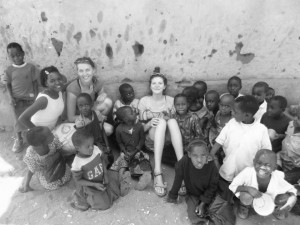Freya Kendall has written this account of her work placement in Tanzania working with Raleigh International.
What do you remember from your primary school years? Practising the shape of ‘a’s over and over in your exercise book? Being read exciting stories out of colourful books by the teacher? Maybe chanting your times tables over and over again until the point where you drive your parents mad? Perhaps taking home models and artwork you created from various yogurt pots and egg boxes? These are all happy memories that we take for granted in this country, but it wasn’t until I spent 10 weeks living and working out in rural Tanzania that I came to understand that many children in Tanzania, and Africa generally, do not obtain a decent primary school education due to such a huge lack of basic resources and materials.
During the summer of 2013, I was sent out to rural Tanzania for 10 weeks to work on behalf of Raleigh International and the International Citizen Service (ICS) to work on a number of different projects to ultimately cultivate development and progression of the Millennium Development Goals (MDGs) set up by the UN in 2000. One such goal is to have implemented universal primary education across the world by 2015. Sadly, I don’t think this goal will be achieved in time, not only because there is still a great deal of work for the UN and various charities and NGOs to do, but because existing schools are struggling to properly educate their children because they have very few resources to do so.

I visited and taught at various primary schools within a 20 kilometre radius of where my team and I were living, and at each primary school we frequently came across the same problem: the teachers struggle to teach the children as there simply are not enough decent resources to go around. Classes of 40, 50 or even over 60 children with one teacher would sometimes have only four or five battered old textbooks to work from. Many of the children did not have proper exercise books, as these are not given out by the school, but rather have to be paid for by the family. As a result of this, high numbers of children did not have an exercise book because their family simply could not afford one. Many of the children did not have a pen or a pencil of their own, and virtually all the textbooks I came across (though it has to be said that there were not many) were extremely outdated and not appropriate for primary school curriculum.
How can children be expected to learn the most basic maths and literacy skills if such basic resources cannot be provided? How can we look to implement universal primary school education across the world if the existing schools are not able to educate their children properly? We all seem to agree that it is education which is the key to breaking the poverty cycle, so we must work to provide schools with the most basic of materials to allow the teachers there to give the children the best possible education.
What I am urging is for people to have a look in the loft, in the old bookshelf which houses all manner of books no one ever looks at, and give whatever books and resources they can to the wonderful charities that can take donations and distribute them to schools across Africa. It may not seem like much to send a few books across, but I know first-hand that any donations will be highly appreciated and could change the lives of children, families and generations to come.
Here are just a few charities which gratefully accept book and monetary donations:
If you’re interested in hearing more about what I, my team or other teams have got up to out in Tanzania, here is a link to the weekly blogs we wrote whilst we were out there.
To learn more about the life changing work that Raleigh International do or the International Citizen Service, please visit Raleigh International or International Citizen Service.
For more detailed information of the Millennium Development Goals, please visit the website.
